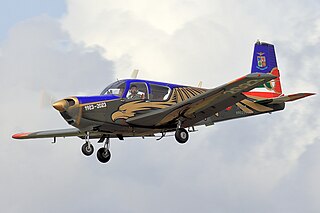Related Research Articles

The IMCO CallAir A-9 is an agricultural aircraft that first flew in 1962, a development of the company's previous successful crop-dusters. It is typical of aircraft of its type - a single-seat aircraft with a low wing incorporating spraying gear.

The Piper PA-24 Comanche is an American single-engine, low-wing, all-metal monoplane of semimonocoque construction with tricycle retractable landing gear and four or six seats. The Comanche was designed and built by Piper Aircraft and first flew on May 24, 1956. Together with the PA-30 and PA-39 Twin Comanches, it made up the core of Piper's lineup until 1972, when the production lines for both aircraft were destroyed in the 1972 Lock Haven flood.

The Pitts Special is a series of light aerobatic biplanes designed by Curtis Pitts. It has accumulated many competition wins since its first flight in 1944. The Pitts biplanes dominated world aerobatic competition in the 1960s and 1970s and, even today, remain potent competition aircraft in the lower categories.

The Aero Boero AB-95 is a small Argentine civil utility aircraft that first flew on March 12, 1959. It was built by Aero Boero S.A. of Córdoba. The AB-95 is a conventional high-wing monoplane built of fabric-covered metal structure. It has fixed undercarriage.

The Aero Boero AB-115 is an Argentine civil utility aircraft. It was developed from the AB-95-115, a refined AB-95 with a more powerful engine and improved aerodynamics. Specific differences included wheel spats, a redesigned engine cowling molded of fiberglass, and aluminum ailerons and flaps.

The Aero Boero AB-180 is an Argentine civil utility aircraft, a substantially improved development of the AB-95. It featured a more powerful engine and incorporated the aerodynamic changes made on the AB-115 and improved on them. The first example flew in 1967 and was in production until 2000.
The Aero Boero AB-150 is an Argentine civil utility aircraft, developed in parallel with the AB-180 as a lower-cost, lower-powered version of that aircraft. Like the 180, it was produced by Aero Boero in long-range and agricultural variants.
The Aero Boero 260AG is an Argentine agricultural aircraft that first flew in 1973. Despite the similarity in designation, it is completely different from and unrelated to the Aero Boero AB-260.

The PA-25 Pawnee is an agricultural aircraft produced by Piper Aircraft between 1959 and 1981. It remains a widely used aircraft in agricultural spraying and is also used as a tow plane, or tug, for launching gliders or for towing banners. In 1988, the design rights and support responsibility were sold to Latino Americana de Aviación of Argentina.

The Embraer EMB 202 Ipanema is a Brazilian agricultural aircraft used for aerial application, particularly crop dusting. It is produced by Indústria Aeronáutica Neiva, a subsidiary of Embraer located in Botucatu, Brazil. The latest version of this aircraft is the first ethanol-powered fixed-wing aircraft, which could give it an economical advantage over the gasoline version. The aircraft is widely employed in Brazil, having market share of about 80%, and the 1,000th delivery was completed on 15 March 2005. Besides aircraft, alcohol-conversion kits for gasoline-powered Ipanemas are also sold.

The Bellanca Viking and Super Viking are a series of single-engine, four-seat, high performance, retractable gear aircraft manufactured in the USA during the 1960s and 1970s. The aircraft developed through modifications of classic designs by the aviation pioneer Giuseppe Bellanca. A total of 1,356 Vikings have been produced with most production between 1968 and 1975.

The PZL-105 Flaming (flamingo) is a Polish short-takeoff-and-landing (STOL) utility aircraft designed by PZL "Warszawa-Okęcie". It remained a prototype.

The SIAI-Marchetti S.205 is an Italian four-seat, single-engine, light airplane, manufactured by SIAI-Marchetti. The S.205 made its maiden flight in 1965. The Italian Air Force employs a version called S.208.

The MBB 223 Flamingo was a light aircraft developed in West Germany in the 1960s in response to a competition for a standard trainer for the country's aeroclubs. Designed by SIAT, it was a conventional low-wing monoplane with fixed tricycle undercarriage. The cockpit was enclosed by a large bubble canopy. SIAT had not undertaken much production of the type before the firm was acquired by MBB in 1970. Eventually, the new owners transferred production to CASA in Spain.

The Robin HR100 is a French four-seat light monoplane, designed by Chris Heintz and built by Avions Pierre Robin as metal-winged version of the Robin DR253 Regent.

The Maule M-5 is an American four-seat cabin monoplane designed and built by the Maule Aircraft Company.

The Rockwell Commander 112 is an American four-seat single-engined general aviation aircraft designed and built by North American Rockwell starting in 1972. In 1976, they introduced the turbocharged version 112TC and mounting a larger engine with other minor improvements they introduced the Rockwell Commander 114. A total of approximately 1,300 examples of all models were produced before the production line shut down in 1980. In 1981, the type certificate owner was Gulfstream Aerospace, but that company had no interest in single-engine piston production.

The Wassmer WA-40 Super 4 Sancy is a French single-engined light aircraft of the 1960s and 70s. A single-engined low-winged monoplane with retractable nosewheel undercarriage, variants include the more powerful WA 4/21 Prestige and the WA-41 Baladou with a fixed undercarriage.

The Pilatus PC-8D Twin Porter was a Swiss ten-seat light transport built by Pilatus Aircraft. The type did not go into production and only one was built.
The Zenair CH 180 Super Acro-Z is an aerobatic light aircraft, that was designed by Chris Heintz and built by Zenair in the 1980s.
References
- Notes
- BIbliography
- Taylor, John W. R. Jane's All The World's Aircraft 1971–72. London:Jane's Yearbooks,1971. ISBN 0-354-00094-2.